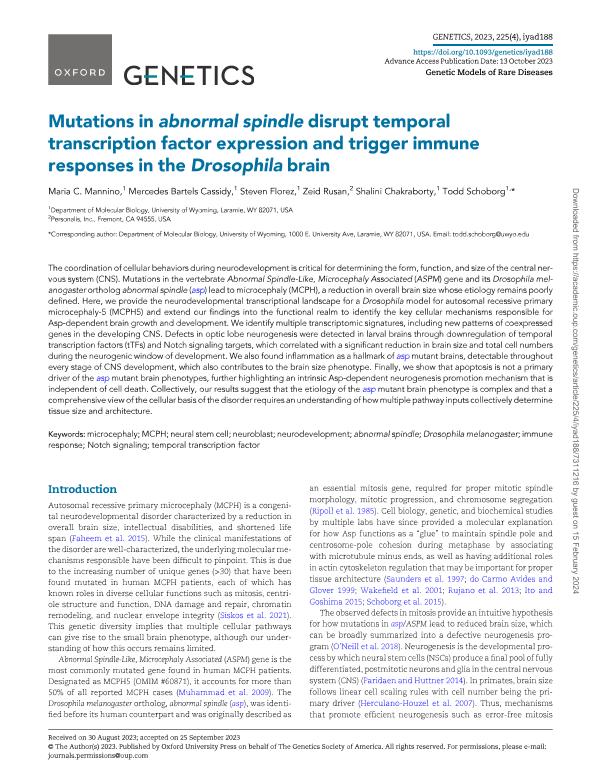Artículo
Mutations in abnormal spindle disrupt temporal transcription factor expression and trigger immune responses in the Drosophila brain
Mannino, Maria Constanza ; Cassidy, Mercedes Bartels; Florez, Steven; Rusan, Zeid; Chakraborty, Shalini; Schoborg, Todd
; Cassidy, Mercedes Bartels; Florez, Steven; Rusan, Zeid; Chakraborty, Shalini; Schoborg, Todd
 ; Cassidy, Mercedes Bartels; Florez, Steven; Rusan, Zeid; Chakraborty, Shalini; Schoborg, Todd
; Cassidy, Mercedes Bartels; Florez, Steven; Rusan, Zeid; Chakraborty, Shalini; Schoborg, Todd
Fecha de publicación:
10/2023
Editorial:
Genetics Society of America
Revista:
Genetics
ISSN:
0016-6731
Idioma:
Inglés
Tipo de recurso:
Artículo publicado
Clasificación temática:
Resumen
The coordination of cellular behaviors during neurodevelopment is critical for determining the form, function, and size of the central nervous system (CNS). Mutations in the vertebrate Abnormal Spindle-Like, Microcephaly Associated (ASPM) gene and its Drosophila melanogaster ortholog abnormal spindle (asp) lead to microcephaly (MCPH), a reduction in overall brain size whose etiology remains poorly defined. Here, we provide the neurodevelopmental transcriptional landscape for a Drosophila model for autosomal recessive primary microcephaly-5 (MCPH5) and extend our findings into the functional realm to identify the key cellular mechanisms responsible for Asp-dependent brain growth and development. We identify multiple transcriptomic signatures, including new patterns of coexpressed genes in the developing CNS. Defects in optic lobe neurogenesis were detected in larval brains through downregulation of temporal transcription factors (tTFs) and Notch signaling targets, which correlated with a significant reduction in brain size and total cell numbers during the neurogenic window of development. We also found inflammation as a hallmark of asp mutant brains, detectable throughout every stage of CNS development, which also contributes to the brain size phenotype. Finally, we show that apoptosis is not a primary driver of the asp mutant brain phenotypes, further highlighting an intrinsic Asp-dependent neurogenesis promotion mechanism that is independent of cell death. Collectively, our results suggest that the etiology of the asp mutant brain phenotype is complex and that a comprehensive view of the cellular basis of the disorder requires an understanding of how multiple pathway inputs collectively determine tissue size and architecture.
Archivos asociados
Licencia
Identificadores
Colecciones
Articulos(INIBIOLP)
Articulos de INST.DE INVEST.BIOQUIMICAS DE LA PLATA
Articulos de INST.DE INVEST.BIOQUIMICAS DE LA PLATA
Citación
Mannino, Maria Constanza; Cassidy, Mercedes Bartels; Florez, Steven; Rusan, Zeid; Chakraborty, Shalini; et al.; Mutations in abnormal spindle disrupt temporal transcription factor expression and trigger immune responses in the Drosophila brain; Genetics Society of America; Genetics; 225; 4; 10-2023; 1-21
Compartir
Altmétricas



